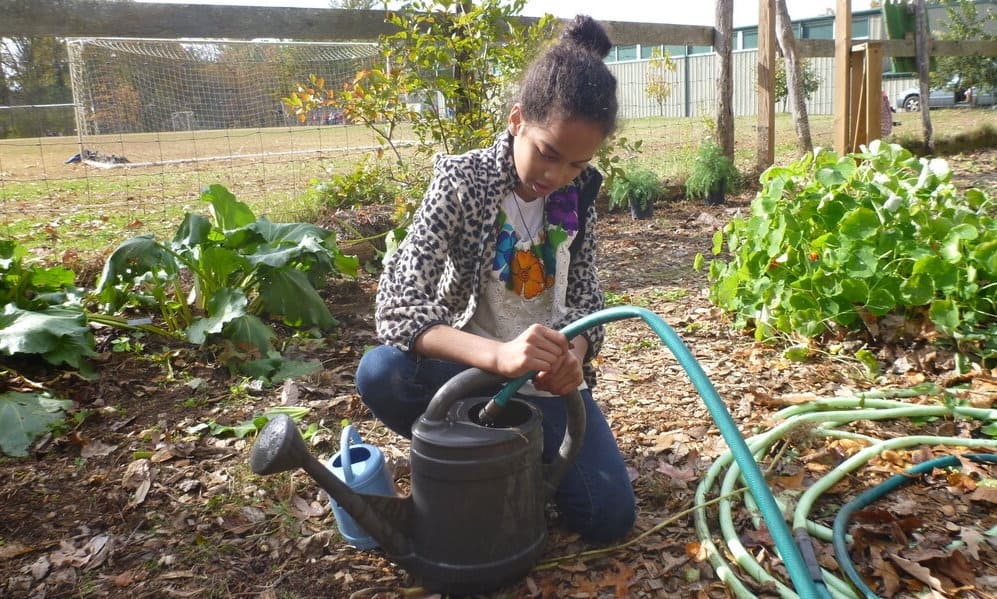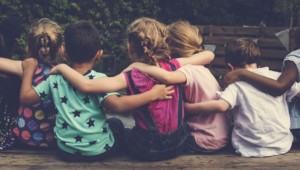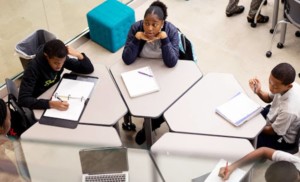Modern Classrooms Support SEL and an Assets Based Approach

By: Ben Owens
“…we routinely have nearly 100% attendance to online live classes, and over 98% of all assignments this school year have been turned in.” -Jason Carter, Teacher, Evergreen Community Charter School
This type of engagement is impressive any time, but how is it possible during a global pandemic? The answer lies in how schools such as Evergreen are approaching the realities of remote and hybrid learning, viewing them not as deficits, but as opportunities. These schools have resolved to remain true to their core values of learner-centeredness, while continually improving works best for students.
Rather than reverting to a traditional school model rooted in compliance and control, these schools are doing the admittedly harder, but more rewarding work to continue strategies such as project-based learning, social and emotional learning, mastery learning, and peer collaboration, even in remote and hybrid environments. As they do, they are not only proving that such strategies do still work, but are continuing to refine them so that they will be even more impactful in a post-pandemic world.
For example, according to Jason Carter, Evergreen has always put relationships at the center of everything they do. “We support the SEL needs of students first and have worked to build reciprocal trust with all stakeholders. As such, parents and students are much more likely to reach out when they need help.” Because this SEL investment was part of the school’s ethos, there was no question as to whether it would be central to their online environments.
Kip Hottman, describes how he and his fellow teachers at Wellington Middle School are also using these uncertain times for collaborative innovation: “COVID raised our awareness of the need to better equip students with 21st-century skills. Where I was previously comfortable in my practice, I now pushed myself to commit to more personalized learning in my teaching practice.”
Using the Modern Classrooms Project framework, he and others developed asynchronous and synchronous support and videos for all activities. “It has been exhausting but rewarding for me professionally and I’d love to say that I would have shifted my pedagogy without the pandemic, but if I’m honest with myself, this challenge has made me a better teacher.”
Coastal Leadership Academy has historically had a strong PBL focus with deep investments in student relationships. They made an early decision to not only maintain these strategies but to also include a standards-based approach when moving online. CLA teacher Sarah Vicini describes how students now exercise more agency for their learning: “Moving to a standards and mastery approach has radically changed the growth mindset in my students. They realize that the focus is on what they know and how well they know it, constantly looking for opportunities to demonstrate their knowledge and making thoughtful connections between previously learned content and other curricular areas.”
Project-based learning can be a challenge even in the best of circumstances, so the staff at the Tahoe Expedition Academy knew they had to get creative to continue the school’s legacy of high quality, community-facing projects. Such projects are designed to include significant time for student inquiry through field experiences and discussions with experts. Rather than abandoning this core PBL element, the school used Nepris to source virtual experts, as well as had students attend a virtual meeting of the Tahoe Economic Summit to gain better insight on how to connect their academic content to local issues.
These entry points led to follow up conversations with experts, including data scientists and advocates with the Tahoe Coalition for the Homeless (TCH). Those conversations helped the students develop deep empathy for an issue in their own backyard and ultimately translated into a project where they could do something about it. The math students also used youcubed “Data Talks” as a model to analyze local data as a way to refine their persuasive communication skills. “The students created persuasive videos based on what they learned about homelessness to answer the question, ‘Why should people donate to TCH?’”
Each of these examples demonstrates what’s possible when a school takes an asset-based lens to the many challenges that COVID-19 brings. These examples, and many like them, are a reminder of what’s possible when we resolve to continue to do what works but to also continue to iterate and make the student experience even better.
The innovations they develop and refine will have staying power well after these schools return to whatever “normal” looks like. As Kip Hottman says when reflecting on what his school will look like in a post-COVID world, “It’s hard to say exactly, but we do know that it will be learners who join together and control their learning, bridging the gap between school and the community. I can’t wait!” What are you doing to create this same future for your students?
- How the International School of Prague Inspires, Engages, and Empowers Learners
- A Platform to Support Competency-Based PBL
Ben Owens spent 11 years as a physics and mathematics teacher at a small, innovative public school of choice in rural Appalachia after a long career as an engineer. He now works as the co-founder of Open Way Learning, a nonprofit that helps schools create the local conditions for learner-centered innovation in their own communities. He is the co-author of Open Up, Education! How Open Way Learning Can Transform Schools.
Stay in-the-know with innovations in learning by signing up for the weekly Smart Update.






0 Comments
Leave a Comment
Your email address will not be published. All fields are required.